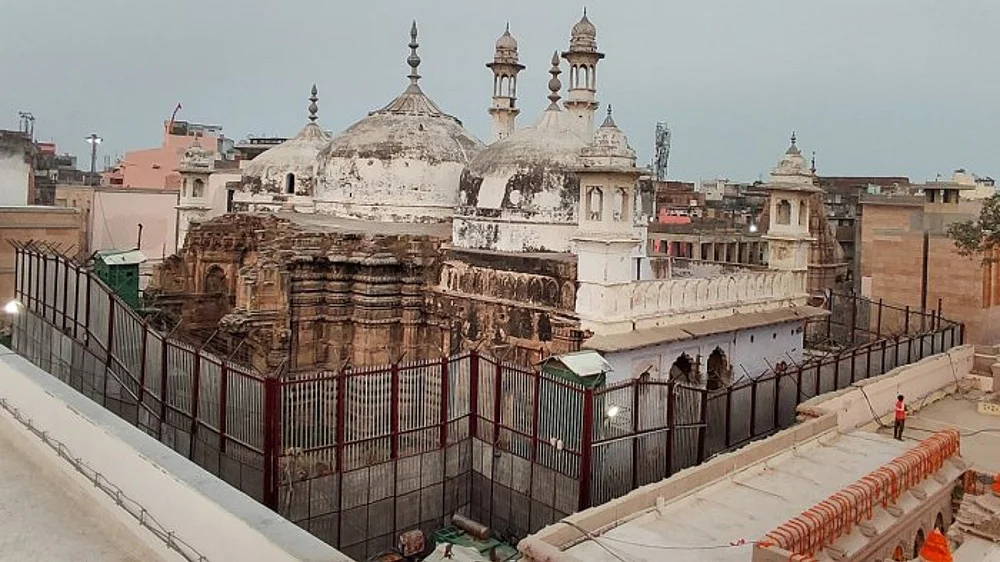Editorial: When reparations are uncalled for
This is not the first instance when demands were made to reclaim mosques built on historic temple lands. In 1992, one such demand boiled over when Hindutva outfits demolished the 16th century Babri Masjid in Ayodhya.

CHENNAI: A divisive narrative is playing out in the ghar-wapsi or homecoming episode of India’s religious institutions. Earlier this month, a group of petitioners approached the court with claims that the ancient 17th century Gyanvapi mosque located in Varanasi was built over the ruins of a mediaeval-era Hindu temple that was demolished by a Mughal emperor. The petitioners had sought access to pray inside the compound of the mosque arguing that the complex still houses Hindu idols, more specifically a shivalinga, a claim that has been contested by the mosque’s authorities. The mosque is separated by a wall from the adjacently located Kashi Vishwanath temple on the banks of river Ganges, where the two communities have been peacefully coexisting for three centuries.
After a local court in Varanasi ordered for the survey of the mosque’s compound, a video revealed the presence of a stone structure inside a reservoir used by devotees to perform ablution before prayers. So, the court restricted large gatherings inside the mosque, a decision that was overturned by the Supreme Court, which allowed prayers to be resumed there. However, the Apex Court had also ordered authorities to cordon off the area where the stone shaft was found, which has put it out of reach of the worshippers. The development has snowballed into a debate with calls coming in from various Hindu nationalist outfits to begin unearthing the origins of ancient Muslim religious institutions.
This is not the first instance when demands were made to reclaim mosques built on historic temple lands. In 1992, one such demand boiled over when Hindutva outfits demolished the 16th century Babri Masjid in Ayodhya. This became a flashpoint for religious strife as over 2,000 people, a majority of them Muslims, lost their lives in the ensuing riots.
In a 2019 judgement, the Supreme Court handed over the disputed land over to the Hindus. A grand temple is now being constructed on these premises. Following the demolition of the Babri Masjid, the Supreme Court had assured the minority community that the Ayodhya case would not be used as a precedent to entertain any further contentious cases. The Court had referred to the Places of Worship Act, 1991, which forbade the conversion of a place of worship, stipulating that its religious character should be maintained as “it existed” on August 15, 1947.
However, this latest Order passed by India’s top court was likened by many as scraping at old wounds as it has spurred other such petitions. Recently, a Mathura civil judge admitted a fresh suit involving the Shahi Idgah mosque-Shri Krishna Janmabhoomi dispute. An advocate had sought ownership of the land on which the mosque was built claiming Krishna was born here and that there were proofs of the existence of a temple here. Simultaneously, the Archaeological Survey of India (ASI) opposed a plea brought before a Delhi Court which sought the restoration of Hindu and Jain deities inside the Qutub Minar complex. The ASI retorted saying it was not a place of worship and that the existing status of the monument cannot be altered. The suit claimed that as many as 27 temples had been partially destroyed by Qutubuddin Aibak, a general in the army of Mohammad Gauri. The Quwwat-ul-Islam Mosque was erected inside the complex by reusing the material, the petitioner alleged.
It is essential to reiterate the 2019 Babri Masjid verdict which referred to the principle of non-retrogression which implies that a right once bestowed upon a people cannot be revoked, and added that it is a foundational feature of India’s constitutional principles, of which secularism is a major component. A historical wrong cannot be used as an excuse to play vote bank politics in the present.
Are you in Chennai? Then click here to get our newspaper at your doorstep!
Visit news.dtnext.in to explore our interactive epaper!
Download the DT Next app for more exciting features!
Click here for iOS
Click here for Android



